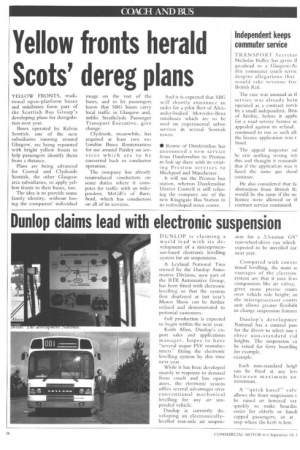Dunlop claims lead with electronic suspension
Page 18

If you've noticed an error in this article please click here to report it so we can fix it.
DUNLOP is claiming a world lead with its development of a microprocessor-based electronic levelling system for air suspensions.
A Leyland National Two owned by the Dunlop Automotive Division, now part of the BTR Automotive Group, has been fitted with electronic levelling so that the system first displayed at last year's Motor Show can be further refined and demonstrated to potential customers.
Full production is expected to begin within the next year.
Keith Allen, Dunlop's export sales and applications manager, hopes to have :'several major PSV manufacturersfitting the electronic levelling system by this time next year.
While it has been developed mainly in response to demand from coach and bus operators, the electronic system offers several advantages over conventional mechanical levelling for any air suspended vehicle.
Dunlop is currently developing an electronicallylevelled rear-axle air suspen
sion for a 3.5-tonne GIP rear-wheel-drive van which expected to be unveiled ear next year.
Compared with conver tional levelling, the main at vantages of the electron: system are that it uses fewl components like air valves; gives more precise contn over vehicle ride height; an the microprocessor contrt unit allows greater flexibilit to change suspension feature:,
Dunlop's developmer. National has a control pan, for the driver to select one c three non-standard rid heights. The suspension ca be raised for ferry boardinE for example.
example.
Each non-standard heigf can be fixed at any ley( between maximum an minimum.
A "quick kneel" valv allows the front suspension t be raised or lowered ver quickly to make boardin easier for elderly or handi capped passengers, or at stop where the kerb is low.




















































































